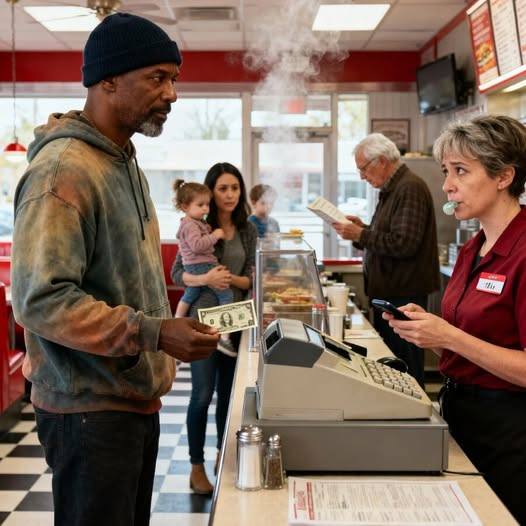Jordan Ellis stepped out of his black SUV on a crisp Monday morning, dressed in a way designed to deceive. The man known for tailored suits, gleaming cufflinks, and a watch that could buy a small condo now wore faded jeans, a stretched-out hoodie, and a knit cap pulled low over his face. He looked like any other customer bracing for another grinding week—not a millionaire who owned a nationwide restaurant empire. That was exactly the point. He needed to see his first diner the way the public did: without polished smiles, spotless floors, or staff on their best behavior.
He crossed the street toward the downtown location he had opened years ago, when he was just a guy with a beat-up food truck and more ambition than sense. Back then, the diner barely made enough to keep the lights on. His mother had stood in that cramped kitchen, rolling dough for pies and humming old country songs, while he scrubbed dishes or ran orders. That diner had been the start of everything—the foundation of his empire—and he refused to let it fall apart.
Lately, complaints had been stacking up: rude employees, long waits, cold food, wrong orders—the careless behavior creeping in slowly, like mold behind the wall. To truly understand the problem, he couldn’t appear as the boss. He had to be an invisible customer, one they clearly didn’t care about.
The familiar scent hit him as he stepped inside: bacon sizzling, coffee brewing, bread warming in the oven. Normally, it stirred nostalgia. Today, it tightened his chest. The red vinyl booths and checkered floors were unchanged, but the warmth—the soul of the place—was gone. Staff barely noticed him. No greeting. No “How can I help you?” Just dead air.
Two cashiers manned the counter. The younger, in a pink apron, leaned against the register, scrolling on her phone and snapping gum loudly. The older, Denise, glanced up long enough to sigh.
“Next,” she muttered.
“Good morning,” Jordan said.
She ignored him, punching in his order with disdain, then flicking the change across the counter. Coins scattered. She didn’t care.
He slid into a corner booth and watched. It wasn’t chaos. It wasn’t understaffing. It was laziness. A mother asked a question about her child’s meal three times—no response. An elderly man inquired politely about a senior discount—Denise brushed him off. A cook cursed loud enough for everyone to hear.
Then came the whispering.
The young cashier leaned toward Denise. “Did you see that guy with the sandwich? Looks like he crawled out of a tunnel.”
Denise snorted. “Please. Bet he complains about the price.”
They laughed.
Jordan clenched his jaw. It wasn’t the insult—it was the realization that this was their default: belittling anyone they assumed had no money. His mother had taught him to judge people not by their pockets or their clothes, but by how they treated others.
A construction worker walked in, dusty and sunburned from his morning shift. He politely asked for a cup of water. Denise snapped, “If you’re not buying something else, don’t loiter.”
That was it.
Jordan stood and walked to the counter. Denise barely looked at him.
“Customer service number’s on the receipt,” she muttered.
“I’m not calling customer service,” he said. “I’m asking: is this how you treat everyone, or just the people you think don’t matter?”
The young cashier crossed her arms. “You’re exaggerating.”
Jordan pulled off his knit cap. The room shifted instantly. Conversations stopped. Heads turned. The cook froze, spatula mid-air. Denise stumbled back as recognition hit.
“I’m Jordan Ellis,” he said, calm but firm. “I built this diner from nothing. My mother stood in that kitchen, hands aching, rolling pies. She always said anyone who walks through these doors deserves kindness—rich or poor, clean or dusty. You’ve forgotten that.”
The manager rushed out, pale and panicked. “Mr. Ellis—I didn’t know you were—”
“That was intentional,” Jordan interrupted. He turned to the cashiers. “You’re suspended immediately. Ruben will decide if you return after full retraining. If you can’t respect customers, you don’t belong here.”
The young cashier’s eyes filled. Jordan didn’t soften. “Save the tears. You’re not sorry. You’re cornered. There’s a difference.”
They left without another word.
Jordan grabbed an apron from the hook and tied it on. Staff stared. Customers stared. He didn’t care. He stepped behind the counter like he used to, poured water for the construction worker, apologized to the mother, checked on the elderly man, refilled coffees, wiped tables, swept floors. Whispers spread as people recognized him. Some smiled. An older woman clapped quietly.
For the first time in years, he felt the fire that had built his empire—the reminder that service mattered, that people mattered.
When the rush slowed, he stepped outside for a breath of cold air and pulled out his phone.
He texted HR: “Mandatory empathy and service training. Every location. No exceptions. Managers must work one shift per month on the floor. Effective immediately.”
He put the phone away, walked back inside, tightened his apron strings, and took the next order with the same pride he had on the first day he opened these doors.
